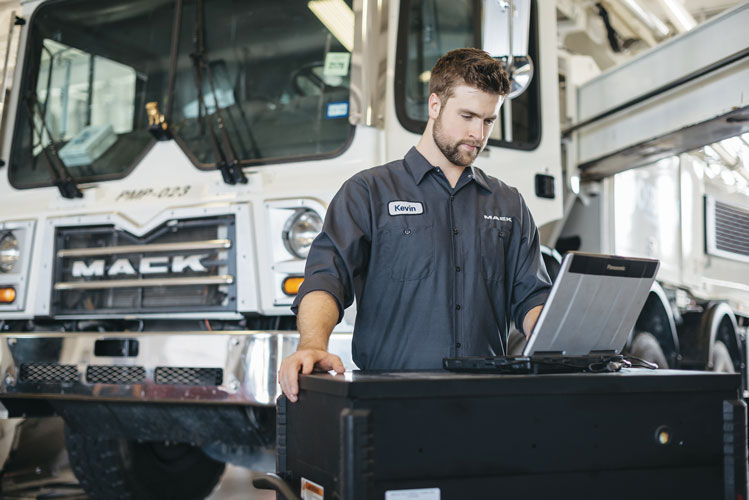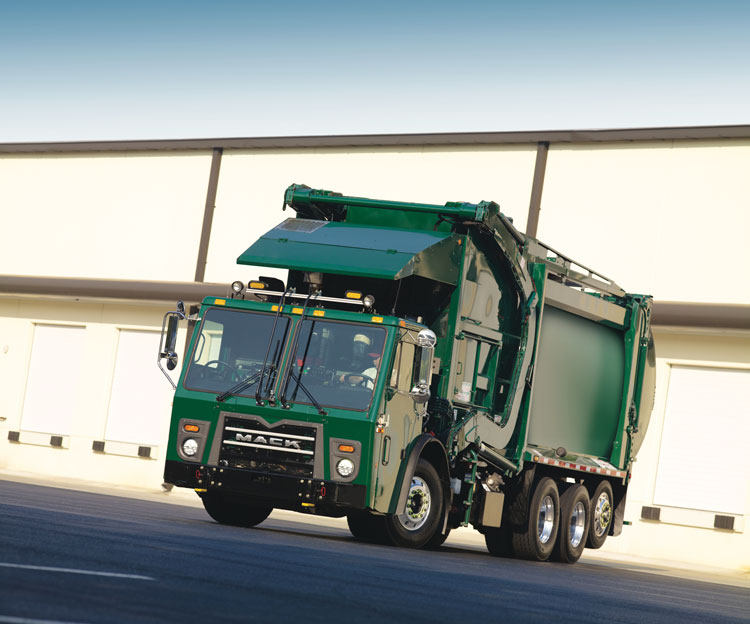Daily inspections, keeping up with regular service intervals and ensuring that any issues are quickly addressed, will go a long way in keeping your trucks up and running while protecting your investment.
By Josh Seiferth
Keeping your refuse vehicle properly maintained, whether through preventive maintenance or repair work, is one of the most important things a driver and fleet manager can do. Maintenance is critical to protecting one’s investment in the truck and ensuring that customers have their waste and recycling picked up on time.
Daily Checks
Start with daily maintenance checks, both at the beginning and end of a shift. These are critical to making sure the truck is work-ready on a daily basis. Making sure there are no leaks, checking oil and other fluid levels, as well as inspecting filters will help verify that vehicles are at peak operating conditions and will not unexpectedly have to be pulled out of service. It also makes good financial sense to conduct daily checks because drivers and fleets that skip this part of their daily routine may inadvertently cost the company thousands of dollars in repairs, while also increasing the likelihood of a vehicle being out of service. This could all be avoided by taking the time to do an inspection twice daily.

Maintenance Schedule
Once the daily inspection is conducted, it is important to pay attention to the OEM’s maintenance schedule. Maintenance intervals are determined by the manufacturer after stringent testing is conducted by engineers, so the guidelines are more than a recommendation—they are a “must do.” Collection vehicles have intense stop-and-go situations and also regularly visit landfills, so making sure vehicles are kept up-to-date with preventive service will go a long way in helping to keep them in-service.
Delaying preventive maintenance, such as changing the oil, could end up with disastrous results, including the failure of equipment, so it is imperative that fleets follow manufacturer’s guidelines for scheduling maintenance work on each vehicle. This will help increase the total cost of ownership of the vehicle and ensure that trucks maintain their long-term durability and reliability. Skipping routine maintenance can also negate warranties, so it is critical that fleets follow the manufacturer’s guidelines so they are not caught unaware later should they have a claim.
Telematics Solutions
Fortunately, keeping up with preventive maintenance does not have to be complicated. Fleets can schedule preventive maintenance and repairs during planned downtime so that they are maximizing their refuse vehicles’ collection time. Use telematics solutions to keep it simple. Fully integrated solutions can link drivers to live 24/7 support and repair centers through web-based service management programs.
Keeping up with open campaigns—especially software updates—is also critical in keeping your truck up and running in a safe manner and to maintain future durability and reliability. As with any device, whether it is an automobile, a truck or even a cell phone, it is critical to keep the telematics tools up-to-date. In the modern world, software changes and updates rapidly. OEMs are continuously improving their products all the time. Be sure to keep in touch with your dealer and OEM in order to keep your vehicle running with the latest updates.

OEM fleet service management tools will help fleets keep up-to-date with the latest improvements for their vehicles. These tools are specifically designed to troubleshoot the individual vehicles and critical components, so the fleet can be informed of regular maintenance, as well as any issues that might arise. This will allow the fleet to schedule maintenance when it is most convenient for them, while minimizing vehicle downtime. Additional online (or in-person) training is available from the OEM for dealers and fleets. This training will help keep fleets and dealers up-to-date with the latest equipment maintenance techniques.
Protect Your Investment
With proper vigilance and ongoing checks to make sure your refuse vehicle is operating smoothly, the lifecycle of your truck can be extended. Daily inspections, keeping up with regular service intervals and ensuring that any issues are quickly addressed, will go a long way in keeping your trucks up and running while protecting your investment. | WA
Josh Seiferth has been the Product Manager for cab over vehicles for Mack Trucks (Greensboro, NC) since January 2020. He has more than 20 years of professional experience, with the last 10 years in the heavy truck industry focused on engineering and project management. Mack GuardDog Connect, Mack’s fully integrated solution, links drivers to live 24/7 support and also to repair centers through Mack ASIST, Mack’s web-based service management program. Mack OneCall agents are live and offer round-the-clock support to customers experiencing planned and unplanned service events, including scheduling service and repairs when it is most convenient to them at a location that works best for their route. GuardDog Connect also enables Mack Over The Air, which offers remote software updates for powertrain components for Mack vehicles equipped with 2017 or newer Mack engines. Updates can be made when it works best for the customer by calling an Uptime Agent at Mack OneCall. Josh can be reached at [email protected].
